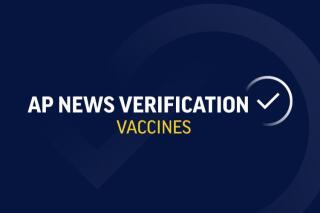No, COVID-19 vaccines aren’t gene therapy

CLAIM: The COVID-19 vaccines “are a gene therapy, NOT a vaccine.”
AP’S ASSESSMENT: False. The COVID-19 vaccines do not change a person’s genes, as gene therapy does, experts say. The shots from Pfizer and Moderna use messenger RNA, or mRNA, to instruct the body to create a protein from the coronavirus. The Johnson & Johnson vaccine, meanwhile, uses a modified adenovirus to trigger an immune response.
THE FACTS: False claims that the vaccines alter humans’ DNA have circulated since before their debut in late 2020.
In recent days, social media posts have shared a claim that the vaccines are “gene therapy” — which involves modifying a person’s genes to treat or cure a disease, according to the U.S. Food and Drug Administration.
The posts point to a clip of Dr. Robert Malone — a vocal critic of the COVID-19 vaccines who did early research on mRNA technology — speaking about the shots during a roundtable event hosted by Republican Sen. Ron Johnson in early December. In the clip, Malone is asked whether the vaccines are actually a form of gene therapy.
“As I’ve said repeatedly, it came out of a gene therapy research program,” Malone responds. “These and the adenoviral vectors are absolutely gene therapy technology applied for the purpose of eliciting an immune response.”
A tweet sharing the clip, which was also posted on Instagram, claimed: “The shots are a gene therapy, NOT a vaccine.”
Experts say that’s false.
“It’s just a very different process,” said Dr. Louis Picker, a professor and associate director of the Vaccine and Gene Therapy Institute at Oregon Health & Science University. “The point of gene therapy is to go in and change the actual coding in the DNA of a person’s cells.”
For example, federal officials in November approved the first gene therapy for the blood-clotting disorder hemophilia.
Picker said gene therapy is “a multi-step process that’s very deliberate, it’s very different than just injecting RNA in a carrier that is designed to be picked up, expressed and elicit an immune response,” as the vaccines do.
The COVID-19 vaccines from Pfizer and Moderna use mRNA to instruct cells to make a protein from the coronavirus and trigger an immune response. The Johnson & Johnson vaccine uses a modified adenovirus, a cold virus, to elicit an immune response.
But none of the vaccines can alter humans’ DNA, as the Centers for Disease Control and Prevention explains.
Michael Barry, a Mayo Clinic researcher who studies gene therapy and vaccines, said in an email that tools used for those vaccines have a relationship to gene therapy technology — but that does not mean the vaccines are actually gene therapy.
“The vectors for mRNA vaccines (lipid nanoparticles) are descendants of non-viral vectors called liposomes that were originally developed for gene therapy,” Barry said, referring to the nanoparticles that are used to transport the mRNA to cells.
He said adenovirus vectors — used by the Johnson & Johnson COVID-19 vaccine — were also previously researched for gene therapy.
Still, there are major differences between the COVID-19 vaccines and gene therapy.
“Gene therapy intends to provide long-lasting protein expression to fix a broken gene and its broken protein,” Barry added. “Vaccines intend a short burst of protein expression to stimulate the immune system.”
Malone did not return a request for comment.
___
This is part of AP’s effort to address widely shared misinformation, including work with outside companies and organizations to add factual context to misleading content that is circulating online. Learn more about fact-checking at AP.
